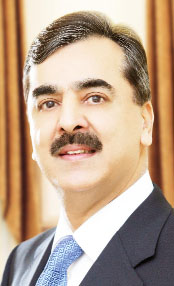ISLAMABAD (Reuters) – Pakistan Prime Minister Yusuf Raza Gilani rejected allegations yesterday that the killing of Osama bin Laden near Islamabad by US forces showed Pakistani incompetence or complicity in hiding the al Qaeda leader.

Opposition politicians have stepped up their criticism of Pakistan’s leaders over the killing of bin Laden in a raid by US special forces in a northern Pakistani town on May 2.
Pakistan welcomed the death of bin Laden, who plotted the September 11, 2001, airliner attacks on the United States, as a step in the fight against militancy but also complained the raid violated its sovereignty.
The fact that bin Laden was found hiding in the garrison town of Abbottabad, 50 km (30 miles) from the capital, has led to accusations that Pakistani security agencies were either incompetent or sheltering the world’s most wanted man.
“Allegations of complicity or incompetence are absurd,” Gilani said in a televised address to parliament, adding that it was disingenuous for anyone to accuse Pakistan, including its spy agency, of “being in cahoots” with the al Qaeda network.
The US raid has added to strains in ties between Islamabad and Washington, which are crucial to combating Islamist militants and to bringing stability to Afghanistan.
The United States wants Pakistan to grant access to bin Laden’s three wives to gain more information about al Qaeda, White House spokesman Jay Carney said yesterday. The wives were at the compound when the US team swooped in and have been detained by Pakistan.
But Carney also said fallout from the bin Laden operation should not hurt US-Pakistani relations.
“We believe it is very important to maintain a cooperative relationship with Pakistan, precisely because it’s in our national security interests to do so,” Carney told a briefing.
NATO Secretary-General Anders Fogh Rasmussen said Western governments had “no alternative” to cooperating with Pakistan in the fight against Islamic militants.
“My bottom line is that we need strong cooperation with Pakistan. If we are to assure long-term peace and stability in Afghanistan and beyond, then we need positive engagement with Pakistan,” Rasmussen told the World Affairs Council in Atlanta yesterday.
The United States has stopped short of accusing Pakistan of providing shelter to bin Laden, but Islamabad is under pressure to explain how bin Laden found refuge.
Gilani warned that unilateral actions such as the US Navy SEALs raid on bin Laden’s hide-out risked serious consequences, but he added that Pakistan placed high importance on its relations with the United States.
Pakistan’s main opposition party has called on Gilani and President Asif Ali Zardari to resign over the breach of sovereignty by US special forces who slipped in from Afghanistan on helicopters to storm the bin Laden compound.
“I think it is a big blow to Pakistan’s sovereignty, Pakistan’s independence and Pakistan’s self-respect,” former Prime Minister Nawaz Sharif told reporters in Lahore. “Pakistan is in a grave crisis and is surrounded by big danger.”
But the White House expressed no regrets about the bin Laden raid.
“We obviously take the statements and concerns of the Pakistani government seriously, but we also do not apologize for the action that we took — that this president took,” Carney said.
Domestic critics say the US raid also raises questions about the safety of Pakistan’s cherished nuclear weapons, but Gilani said any move against them would be met with “a matching response.”
“Pakistan reserves the right to retaliate with full force,” he said.
Pakistani-US relations were already fragile after a string of diplomatic disputes over issues including a big attack by a US drone aircraft in March and CIA contractor Raymond Davis, who shot dead two Pakistanis in January.
Potentially stirring tension further, a Pakistani TV channel and a newspaper published what they said was the name of the undercover CIA station chief in Islamabad.
US officials said the name disclosed in Pakistani media was wrong and that the real station chief would remain at his post. They said they believe the leak was a calculated attempt to divert attention from US demands for explanations of how bin Laden could have hidden for years in Pakistan.
Last year, after the chief of Pakistan’s Inter-Services Intelligence (ISI) agency was named in a US civil case over attacks on the Indian city of Mumbai, the then-head of the CIA’s Islamabad station was named by Pakistani media and forced to leave the country.
The government and military have been embarrassed by the discovery of bin Laden in Abbottabad, near the country’s main military academy.
“If he was really living in that compound for five years … then why didn’t our agencies discover him?” former Foreign Minister Khursheed Mehmood Kasuri told reporters. “This has given anti-Pakistani elements a chance to ridicule us.”
But Gilani said he had full confidence in the armed forces and the military’s ISI which he called a “national asset.” The military would brief parliament in a closed session Friday.
US President Barack Obama said on Sunday that bin Laden likely had “some sort” of a support network inside Pakistan, but added it would take investigations by Pakistan and the United States to find out the nature of that support.
“We think that there had to be some sort of support network for bin Laden inside of Pakistan. But we don’t know who or what that support network was,” Obama said.
“We don’t know whether there might have been some people inside of government, people outside of government, and that’s something that we have to investigate, and more importantly, the Pakistani government has to investigate,” he added.




